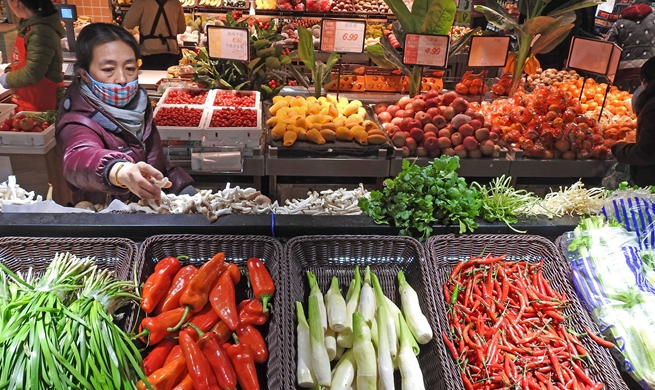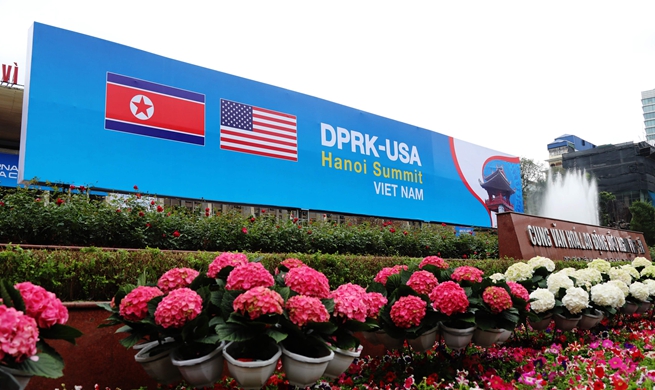by Eric J. Lyman
ROME, Feb. 25 (Xinhua) -- Italian farmers and producers of food and wine should, according to analysts, focus on maintaining high levels of quality and expanding export markets through promotion and reducing trade barriers.
"In Italy, there is an important history of producing top level food and wine and it is imperative for the sector to continue to focus on this," said Francesco Sottile, professor at the University of Palermo, in an interview with Xinhua.
"These products are connected to the land, and they are produced with commitment and passion," said Sottile, who is also a member of the executive committee for Slow Food Italia, a group promoting food traditions.
Most Italian farms are small and family owned. According to information from the country's National Statistics Institute, around 4.1 percent of Italy's workforce are employed in agriculture-related sectors, compared with around 2.8 percent of the workforce in France, a country with slightly larger population and gross domestic product.
What's more, Italian farmers are working on less land compared with France, which, based on data processing company Knoema, has around a quarter more land under cultivation in percentage terms.
"Smaller companies, whether they are farmers, or food or wine makers, face problems because they are less well known than big companies and don't have the resources to promote themselves internationally," said Denis Pantini, head of the agro-industry section at Nomisma, a consultancy.
Scale, Quality for Export
Nonetheless, Italy's agriculture and food and wine sectors have seen the rise of a few big industrial players that have the economy of scale to compete on an international level.
"The big industrial companies are growing but they are also suffering," Sottile said. "Over the long term Italian agriculture production will survive based on quality, not on quantity," he cautioned.
Still, even with a strong focus on quality, Italian companies operating in these sectors have problems stemming from export markets.
Italy is a net importer of agriculture products, mostly because it imports raw materials to make certain food products, such as importing grain to produce pasta, or milk to make some kinds of cheese. Those imports cancel out some of the economic impacts of the sector, but at the same time they would make it easier for farmers and food producers to ramp up production quickly if demand rises, given that Italy's part of the production equation is mostly know-how and not the production of raw materials.
Agriculture and related sectors account for around 2.2 percent of the Italian gross domestic product, a figure analysts believe could grow if certain steps are taken to increase export markets.
Pantini noted that around two-thirds of the exports from Italy's agriculture and related sectors goes to trading partners in the 28-nation European Union. Around a tenth of the total is sent to North America, with the remaining exports divided among the rest of the world.
Most future growth will have to come from the last categories, which are the least mature export markets, he said.
Exploring New Markets
Lorenzo Bazzana, an economist with Coldiretti, Italy's main agricultural trade union, shared the view, saying trade deals can help pave the way for that growth. Italy's most recent bilateral trade deal, signed on Feb. 1 with Japan, is expected to bolster trade between those two countries.
"The government has to prioritize trade deals, giving food and wine producers an opportunity to move into new markets," Bazzana told Xinhua. "Trade agreements are a long-term process but they have to be a priority."
Bazzana pointed to trade negotiations with China, saying that under current rules, Italy can import Chinese-grown apples and pears, "but negotiations to open the Chinese market to Italian apples and pears is still pending."
All the analysts interviewed said the government should also encourage the development of industry groups that can help small producers compete collectively with larger rivals. Sponsoring promotional campaigns in other countries is also a good strategy, though Pantini said promotional strategies have limits.
"We did a study on social media in China and it showed that when Chinese consumers do an Internet search for Italy, only around 5 percent is related to food and wine. Most is about fashion or cars or travel," Pantini said.
Pantini said promotional campaigns are unlikely to move that 5-percent figure much, especially in a market as large as China's. But public initiatives in other areas can have a ripple effect that would help food and wine makers.
"Some cities in Italy have unveiled initiatives to help attract more visits for China and other countries," Pantini said. "That is the best kind of publicity because visitors will taste the products prepared the right way and they are more likely to go home and look for the products they enjoyed," he concluded.













